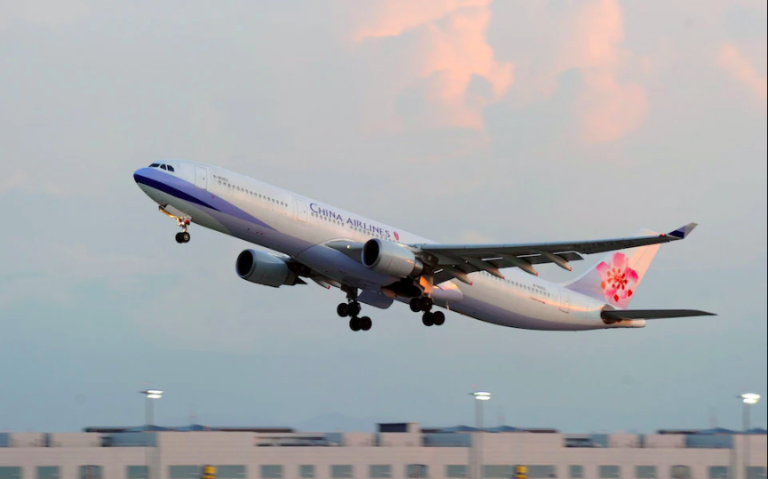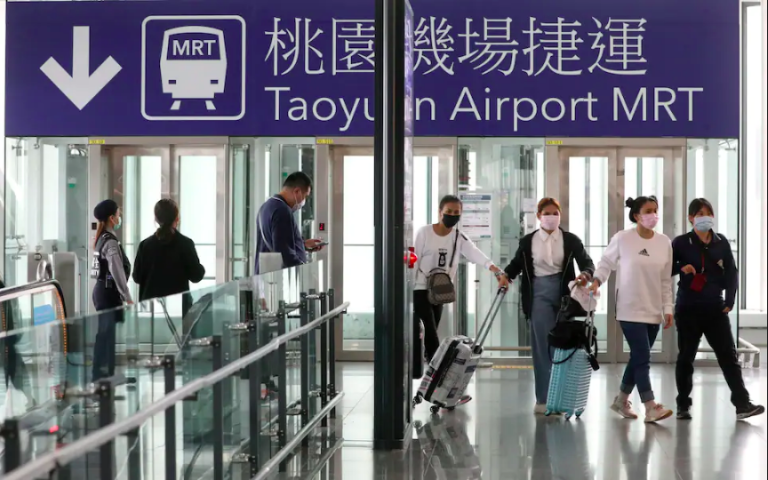‘People think pilots are murderers because we brought back the virus’: Taiwan’s Covid scapegoats
‘Imprisoned’ by quarantine and isolated from their families, flight crews have become social pariahs
By Nicola Smith,ASIA CORRESPONDENT
10 September 2021 • 5:28pm See Here@The Telegraph

The pilot community believes it has been scapegoated after three Covid-19 outbreaks since December were linked to flight crews CREDIT: SAM YEH /AFP
Taiwan’s pilots and aircrews were once admired for their glamourous lifestyles, and feted for operating the flights at the heart of the island’s export-heavy economy.
Now, “imprisoned” by back-to-back quarantine, and isolated from their families, their globe-trotting profession also makes them social pariahs in the eyes of a public that has largely been protected from Covid-19.
Parties, restaurants, gyms and even a trip to the beach with their children are all forbidden for flight crews under some of toughest quarantine rules in the world.
This week, pilots working for Taiwanese airlines warned the toll of 18 months of severe pandemic restrictions had been so damaging to physical and mental health they feared it could compromise flight safety.
“People are trying to not leave each other alone in the cockpit,” one pilot told the Telegraph, describing the exhaustion of being indefinitely deprived of a normal life, while facing rising online hate.
In an online pilot chat group ahead of a Thursday meeting between union representatives and Taiwan’s Civil Aeronautics Administration and Centres for Disease Control, crew members pleaded for safety concerns to be raised.
“Among almost 3,000 pilots some may be depressed and bullied to the point of doing fatal mistakes, if not intentionally? How can I make sure that the colleague next to me won’t be the next Germanwings case,” read one message, referring to the 2015 tragedy when a co-pilot on the German airline deliberately crashed a plane into a mountain.
The severe coronavirus outbreaks ravaging much of Asia has left Taiwan on edge, prompting the government’s Central Epidemic Command Centre (CECC) to tightened rules for aircrews to prevent the more contagious Delta variant from breaking through.
The regime begins with layover flights, where long haul airline crew are monitored by their electronic hotel key to ensure they don’t leave the room until the journey home.

The severe coronavirus outbreaks ravaging much of Asia has left Taiwan on edge, resulting in tightened rules for aircrews CREDIT: ANN WANG /Reuter
On return, fully vaccinated crew now undergo five days quarantine in a hotel or company dorm, followed by nine days of “enhanced self-health management.”
During this period, they must avoid public transport, crowded spaces, group activities and venues that include hospitals, malls, children’s playgrounds, restaurants, places of worship and events such as weddings or concerts, all of which renders regular family life impossible.
The Telegraph spoke to several pilots and their family members, local and foreign, about the impact of indefinite isolation. All requested anonymity to avoid a backlash, and did not wish to name their airlines, who they did not blame for the crisis.
They had decided to speak out not only due to fears that depression could lead to a “catastrophic” event but to counter the growing vilification of their once-respected profession by the public and local media, despite the personal sacrifices of airline staff.
The pilot community believes it has been scapegoated after three Covid-19 outbreaks since December – including a small Delta variant cluster last week – were linked to flight crews.
Airline employees claim rising discrimination, including incidents of schools asking their children to stay home and healthcare facilities refusing to treat them. One pilot reported a colleague had suffered a suspected broken foot for months as he could not get admitted to hospital.
Once proud of their jobs, many no longer admit publicly to their profession.
“You feel ashamed of being a pilot here in Taiwan,” said one. “I’m not going to say I’m a pilot. I feel like I’m hiding, like a thief,” he said.
“People are thinking the pilots are murderers because we brought back the virus,” said another crew member, describing a “witchhunt” atmosphere, fuelled by online hate and bullying, including comments wishing death on pilots.
Constantly shifting rules have left crew confused and nervous that “the slightest violation can cost our jobs,” said the pilot. “We just need to know what is the way out because right now we don’t see any hope.”
Taiwan, an island of 24 million, has been globally championed for its robust pandemic response, which has kept cases down to about 16,000 and deaths at 837 through tight border controls that impose 14 day quarantines on all arrivals.
The government’s success has raised the political pressure to meet high public expectations and placate fears of a serious outbreak while the majority of the population remains unvaccinated.
Meanwhile, air crews and their families have increasingly become collateral damage of the nation’s “zero Covid” strategy.
Despite the pandemic, exports have remained strong over the past year, raising economic growth forecasts for 2021 to 5.88 per cent. About half of shipments are transported by air. Cargo flights operated by the two main carriers EVA Air and China Airlines bring in vital supplies like food and vaccines, and remain crucial to the global supply chain of semiconductors. But the tide of public opinion began to turn against airline crew in December after a Covid-positive New Zealand pilot working for EVA broke the island’s 253-day streak of no local transmissions. He was later fined £7,900 by the authorities and fired from his job for failing to disclose his contacts and activities. The breach resulted in a tiny cluster of four people, but the public was still infuriated. Pilots were also frustrated that they were widely castigated as a group of privileged rule-breakers. “They have done an incredible job at keeping the virus out but unfortunately people see one or two slipups as failure, rather than see thousands and thousands of flights as a success,” said one pilot’s wife.
Taiwan’s largest outbreak of the pandemic in May and resulting three-month lockdown was initially believed to have been triggered by a cluster at an airport quarantine hotel for China Airlines flight crews.
Chen Shih-chung, the health minister, clarified in August that the cluster had not spread to the community, but not before another wave of public anger had been unleashed on airline staff.
“The worst part is the constant media persecution, everywhere you read ‘its the pilots, the pilots!’” said another spouse, adding that she was regularly being scrutinised by parents at her child’s school. “We’re being attacked constantly, pointed at constantly,” she said.
Another blow to staff morale came last week after 55 pilots and flight attendants and their families were quarantined in state facilities after three pilots and one’s teenage son were found to be infected with the Delta variant, resulting in the closure of a high school and 2,855 tests.
Photos leaked to the local media showed bleak rooms with opaque windows, dirty floors and dead insects. For already demoralised pilots, the order to bring their families was a step too far.
The impact of restrictions on family life was creating desperation, said one pilot who spoke of a colleague who had cried in the cockpit because he was barred from seeing his newborn.
But he said staff were afraid to admit to the pressure in case they lost their jobs. “The company is trying to tell us there is a psychiatrist if we want to talk about it. Of course, nobody wants to talk about it,” he said.
Pandemic-related mental health issues are not unique to Taiwanese airlines, nor are the challenges of addressing them.
In June, the Lived Experience and Wellbeing Project at Trinity College, Dublin, which studies the link between aviation worker wellbeing and flight safety, warned that airlines were overlooking mental health in the scramble to get planes in the air again.
In an August 2020 survey of more than 2,000 aviation workers, it found that they had suffered moderate anxiety and depression more than the general population during the pandemic.
“However, the culture in aviation means pilots cannot speak openly – stigma, loss of license, loss of earnings – and avail of the same supports as the rest of the population,” said Dr Joan Cahill, the report’s principal investigator.
“We have established health monitoring processes for aircraft – but not for our people,” she said.
The Telegraph contacted the CAA, CECC and the Taiwanese airlines.
A CAA spokesperson said the body was aware of the mental stress facing pilots and in active talks with the CECC and pilots’ unions on how to improve conditions, snuff out public misconceptions and rearrange working schedules to allow more quality family time.
“The CECC commander is aware of the seriousness of this, and they are trying to find a better way that would be able to balance the mental health of pilots and also the economic export of our country,” she said.
EVA said it was supporting staff in substandard quarantine facilities and “optimising our schedule and method of dispatching flights to relieve some of the physical and mental health stresses our air crews may be experiencing.”
It said it had offered pilots professional counselling sessions and extended leave for mental or physical health reasons. “We also sent a letter to every member of our air crews, thanking them for their tremendous efforts and sacrifices,” the company said.
China Airlines also thanked its pilots. “The physical and mental well-being of pilots is important to China Airlines. A caring team was set up to actively reach out and support pilots put at risk during the line of duty whether they are currently in quarantine or continuing to fly,” it said.
It said it was “remaining vigilant at all times. As aviation safety is our top priority, we strive to ensure the physical and mental wellbeing of every crew member.”
*Additional reporting: John Liu
Protect yourself and your family by learning more about Global Health Security
【中文全文翻譯】
「民眾認為機師將病毒帶回台灣,並稱我們為殺人兇手」:台灣肺炎疫情的代罪羔羊
形同「囚禁」的無限期隔離,使得被迫與家人分離的機組員,成為新一代的社會難民
尼古拉·史密斯/亞洲記者/2021年9月10日 •下午 5:28
台灣的機師和機組員曾因其富有魅力的生活方式而受到民眾欽羨,在著重出口導向型經濟的台灣,他們更因承擔航班的重責大任而受到讚揚。
但現在,形同「囚禁」的無限隔離期,以及與家人長時間的分離,使得這項能夠環遊世界的職業遭到台灣社會鄙棄。
台灣針對機組員實行了幾乎是全世界最嚴格的檢疫規定,機組員被禁止參加派對、進入餐廳、健身房,甚至是帶著孩子去海灘旅行。
台灣航空公司的機師工會於本週提出警告,他們表示過去這18個月的嚴格防疫措施,已對機師的身心健康造成巨大損害,而他們擔心這個情況可能會危及飛行安全。
一名機師告訴《每日電訊報》:「我們盡量不讓彼此單獨留在駕駛艙裡。」他表示,無限期地剝奪正常生活、和面對日益增加的網路仇恨,令他身心俱疲。
在機師工會代表與台灣民航局(Civil Aeronautics Administration,CAA)和疾病管制署(Centres for Desease Control,CDC)於週四進行正式會議之前,機組員在線上的機師談話群組中,懇切地請求有關當局正視飛行安全。
其中一則機師的留言提到:「如果在將近3,000名機師中,有人因沮喪或被霸凌,而非他們所願地犯下致命錯誤怎麼辦?我應該如何確保我身旁的同仁不會發生和德國之翼一樣的憾事?」留言所述之憾事發生於2015年,一名德籍航空公司的副駕駛蓄意將飛機駛向山脈,而造成墜機的悲劇。
嚴重的冠狀病毒疫情肆虐了亞洲大部分地區,台灣因此面臨緊張狀態,促使中央流行病指揮中心(Central Epidemic Command Centre,CECC)提出更嚴格的機組員檢疫規定,以防止傳染力更高的Delta變種傳播。
首先變得更加嚴格的是過夜航班,航空公司以旅館的電子鑰匙控管長程航班機組員,確保他們在執行返台航班之前無法離開房間。
返台時,已完全接種疫苗的機組員會在隔離旅館或公司宿舍進行5天隔離,結束後再進行9天的「加強自我健康管理」。
在「加強自我健康管理」期間,他們被禁止使用公共交通工具、進出擁擠的空間和場所、或參加團體活動,包括醫院、商場、兒童遊樂場、餐廳、禮拜場所以及婚禮或音樂會等活動,這些規定使得他們幾乎不可能擁有正常的家庭生活。
《每日電訊報》採訪了幾名機師及其本地和外籍家庭成員,討論了無限期隔離帶來的影響,採訪的所有對象都要求匿名,以避免遭受群眾的強烈負面反應,亦不願透露他們所屬的航空公司,因為他們都不認為應因此責難公司。
他們之所以決定站出來,不僅是擔心抑鬱症可能會導致「災難性」事件,也為了反擊公眾和當地媒體無視機組員的個人犧牲,持續對他們的職業進行越來越多的誹謗。
機師社群認為,自12月以來爆發的三起Covid-19疫情(包括上週的小型Delta變種群聚)皆被斷定與機組員有關,機組員儼然已成為代罪羔羊。
許多機組員主張,社會對他們的歧視日益嚴重,例如,某些學校要求機組員的孩子不能到校,某些醫療機構則是拒絕為他們進行治療,一名機師回報,他的一位同仁因被拒絕進入醫療院所,而疑似忍受足部骨折已達數月之久。
機組員原本都對自己的職業引以為傲,但他們現在卻不敢公開承認自己是機組員。
一名機師說:「在台灣當機師,你會感到羞恥。我不會說我是一名機師。我覺得我只能躲躲藏藏的,像個小偷一樣。」
另一名機組員說:「人們認為機師是殺人兇手,因為他們把病毒帶回台灣。」他描述台灣現在瀰漫著「獵巫」的氛圍,網路上的仇恨和霸凌更是助長了這種氣氛,甚至有希望機師死亡的評論。
這名機師表示,不斷變化的規定讓機組員感到困惑和緊張,因為「最輕微的違規行為都可能讓我們失去工作。而我們只想知道有沒有可能的解決方案,因為現在,我們真的看不到任何希望。」
台灣是一個擁有2400萬人口的島嶼,因其強有力的疫情因應措施而受到全球擁護,台灣實施嚴格的邊境管制,所有入境者皆須進行14天隔離,台灣目前Covid-19的總病例數僅有16,000例,總死亡人數則為837人。
台灣政府在防疫方面獲得的巨大成功,無形加重了滿足民眾期望的政治壓力,並為這個大多數人口仍未接種疫苗的島嶼,減輕了針對疫情的恐慌感。
與此同時,機組員及其家人卻成為國家「清零」計畫的附帶損害。
儘管國際間發生了嚴重疫情,但台灣過去一年仍有非常驚人的出口量,2021年的經濟成長率甚至預計將提高至5.88%。而其中,大約有一半的貨物是經由空運運輸的。
由長榮航空和中華航空這兩間主要航空公司運營的貨運航班,為台灣帶來了食品和疫苗等重要物資,亦在全球半導體供應鏈有至關重要的地位。
然而,去年12月,一名紐西蘭籍的長榮機師確診為Covid陽性,打破了該島連續253天無社區傳染的紀錄,輿論因此轉而開始批評航空公司機組員。該名機師後續因疫調時未詳實告知接觸及活動史,而被當局罰款7,900英鎊並遭航空公司開除。
該名機師的違規行為僅造成四人確診,但民眾對此怒火沖天,許多機師也為此感到沮喪,因為他們被譴責為一群特權破壞者。
一位機師的妻子對此表示:「他們出色地阻止了病毒的傳播,但不幸的是,民眾將一兩次失誤視為失敗,而無視成千上萬次成功的飛行。」
台灣目前為止最大的疫情爆發發生在去年5月,後續也因此啟動並進行了三個月的三級警戒,而這起疫情最初被認為,是由華航機組員的機場檢疫旅館群聚引起。
衛福部部長陳時中於8月時針對此起疫情進行澄清,他表示該群聚傳染並未傳播到社區,儘管不久前,台灣民眾又再次針對機組員爆發了嚴重的怒火。
另一名機師的妻子表示:「最糟糕的部分是媒體不斷的迫害,到處都可以看到『都是機師造成的!就是他們』的言論」她也補充說,她在孩子的學校,經常受到其他家長非議。「我們不斷地遭受攻擊,不斷地被指指點點。」她說。
上週,三名機師和其中一名機師的十幾歲兒子確診Delta變種病毒後,55名機師和空服員及其家人被送往國家檢疫所隔離,此舉再一次對機組員的士氣造成打擊,並導致一所高中關閉,以及有2,855位民眾進行檢驗。
當地媒體獲得的照片顯示,檢疫所的房間陰暗、窗戶不透明、地板髒污不堪,房內甚至還有昆蟲的屍體,對於已經士氣低落的機師來說,命令他們的家人連帶進行隔離,真的已經太過分了。
一名機師表示,這些對家庭生活造成的限制,使得許多同仁越來越感到絕望,他談到某天有位同仁在駕駛艙裡哭了,因為他被禁止探望他剛出生的孩子。
但這名機師也表示,在害怕失去工作的情況下,員工不會承認他們承受太多壓力。「事實上公司已經聘請心理醫師,希望我們能夠談談我們的感受,但很顯然地,完全沒有人願意跟醫師『談談』。」
然而,並非只有台灣的航空公司正在面臨這些因疫情而起的心理健康問題,或是解決這些問題的挑戰。
今年6月,都柏林三一學院的生活體驗和幸福項目研究了航空業員工幸福感和飛行安全之間的相關性,並警告航空公司在安排航線復航的過程中,忽視了員工的心理健康。
2020年8月對2,000多名航空業員工進行的一項調查也發現,疫情期間,航空業員工比一般民眾承受更多的中度焦慮和抑鬱。
該調查的主要調查員瓊卡希爾博士說:「然而,航空文化意味著機師不能公開談論或是和他人一樣獲取協助 — 否則他們可能會遭社會唾棄、喪失執照、或損失收入。」
她說:「我們有完善的飛機健康監測程序,但針對在飛機上工作的人,卻沒任何相關健康監測程序。」
《每日電訊報》聯繫了台灣民航局、中央流行病指揮中心和台灣航空公司。
台灣民航局發言人表示,該機構意識到機師面臨的精神壓力,針對如何改善工作條件、消除民眾誤解和重新安排工作時間表,正在與中央流行病指揮中心和機師工會進行積極的討論,以讓機師獲得更多的家庭時間。
她表示:「中央流行病指揮中心的指揮官已經意識到這件事的嚴重性,他們正在嘗試找到一種更好的方法,平衡機師的心理健康和我們國家的經濟出口。」
長榮航空表示,他們有許多員工還在不合標準的檢疫所進行隔離,他們已經盡力提供協助,並「優化我們的航班調度和調度方式,以減輕機組員可能面臨的身心健康壓力。」
長榮航空表示已為機師準備專業諮詢課程,機師也可以以精神或身體健康為由,申請延長休假時間,此外,「我們亦致函予每位機組員,感謝他們的努力和犧牲。」
中華航空也表示非常感謝機師,「華航非常重視機師的身心健康,我們已經成立關懷小組,在隔離期間和執行飛行任務期間,積極接觸並支持面臨巨大風險的機師。」
中華航空也提到,他們「始終保持警惕。航空安全是我們的首要任務,因此我們竭力確保每位機組員的心理健康。」